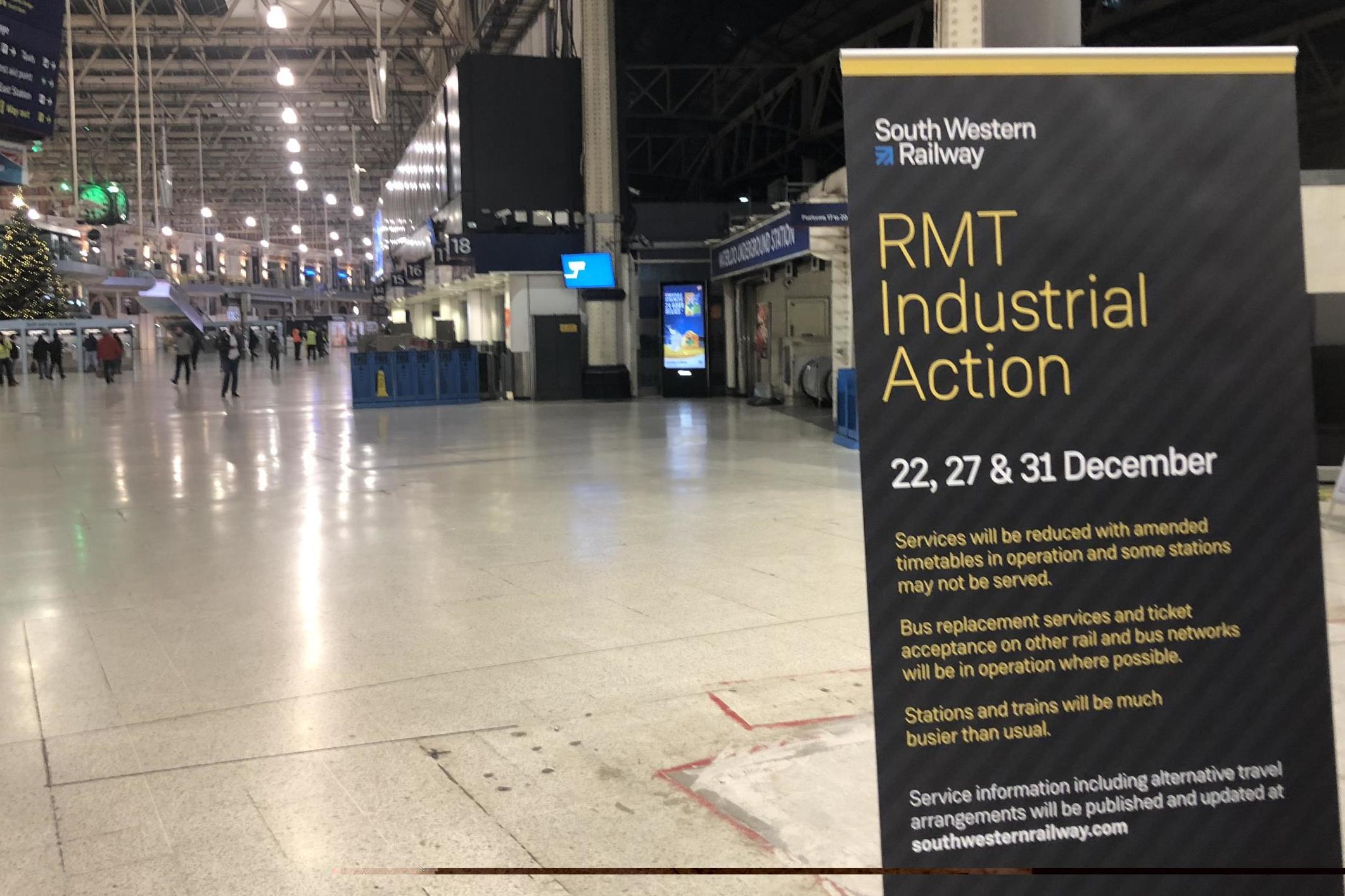New Year's travel chaos: Congestion, strikes, staff shortages, engineering work and price rises mark end of terrible year of travelling
Train services will not return to normal until Wednesday 2 January, which is the day rail fares go up by an average of 3.1 per cent

Your support helps us to tell the story
From reproductive rights to climate change to Big Tech, The Independent is on the ground when the story is developing. Whether it's investigating the financials of Elon Musk's pro-Trump PAC or producing our latest documentary, 'The A Word', which shines a light on the American women fighting for reproductive rights, we know how important it is to parse out the facts from the messaging.
At such a critical moment in US history, we need reporters on the ground. Your donation allows us to keep sending journalists to speak to both sides of the story.
The Independent is trusted by Americans across the entire political spectrum. And unlike many other quality news outlets, we choose not to lock Americans out of our reporting and analysis with paywalls. We believe quality journalism should be available to everyone, paid for by those who can afford it.
Your support makes all the difference.Tens of thousands of travellers face a dismal last day of 2018 and start to the new year, as strikes, staff shortages and train breakdowns exacerbate the problems caused by planned engineering projects. And for airline passengers, the return from Christmas and new year holidays could trigger congestion at the UK’s leading airports.
The final strike of the year by members of the RMT union employed by South Western Railway is causing the cancellation of many services in and out of London Waterloo, the busiest station in Britain.
On the main line from Waterloo via Winchester to Southampton and Bournemouth, only one train an hour is running in each direction – compared with three an hour on normal weekdays.
Passengers between Exeter, Axminster, Crewkerne and London must take a rail replacement bus as well as two separate trains, adding around two hours to the normal journey times.
On some other lines, no service will run, and no buses will be provided.
In Scotland, dozens of trains have been cancelled, mainly because of “a shortage of train crew”. The first train from Inverness to Edinburgh missed out the first 110 miles of its journey, beginning at Perth instead.
Many other inter-city services to and from the capital have been cancelled, including trains to Glasgow and Aberdeen. The morning Inverness to Aberdeen service did not run, and the last train of the year from Glasgow to Dundee will run only as far as Perth.
Around 100 trains in Scotland will run with fewer carriages than normal, with the cause also ascribed to staff shortage. The same issue has caused widespread disruption over the past few weeks.
The ScotRail Alliance managing director, Alex Hynes, said: “We know this isn’t acceptable, and are sorry to customers about this.
“Every single person at the ScotRail Alliance is working hard to improve things for our customers as soon as possible.”
He blamed the late delivery of new trains by Hitachi and Wabtec, which meant services have had to be cancelled to allow crew to be trained, and an RMT overtime ban. ”This is now resolved but made the problem of train crew training worse,” said Mr Hynes.
“Training is ongoing so that we can get services back to normal and we can expect an improvement in the coming weeks. But while we continue to train our conductors and drivers some disruption will remain.”
No trains will run in Scotland on New Year’s Day.
The East Coast main line from London King’s Cross to Yorkshire, Tyneside and Scotland was earlier blocked northbound due to a broken-down train between Huntingdon and Peterborough, with some residual disruption continuing to affect LNER services.
In London, the extended engineering projects at two key terminals, Liverpool Street and Victoria, are due to end in the early hours of Wednesday 2 January.
The main line from Liverpool Street to East Anglia has been closed since before Christmas, as has the link from Victoria to Clapham Junction – which normally continues to Gatwick Airport and Brighton.
Wednesday is also when rail fares increase across the UK by an average of 3.1 per cent, calculated on last July’s Retail Price Index (RPI).
From Swindon to London Paddington, an annual season ticket rises overnight from £8,740 to £9,016.
The unrestricted London-Manchester fare goes up by £6 to £175.
Between Edinburgh and Glasgow an Anytime single rises by 50p to £14.90 – a rise of 3.5 per cent.
But an off-peak single goes up by only 30p to £13.20, an increase of 2.3 per cent, because of a pledge by the Scottish government to keep fare rises below the RPI outside rush hours.
Most of Britain’s major airports have been relatively quiet since Christmas, though Luton and Edinburgh have experienced busy weekends.
The peak day for inbound arrivals at the UK’s biggest airport, Heathrow, is Wednesday 2 January, with most other airports expecting a surge in arrivals on Sunday 6 January.
Join our commenting forum
Join thought-provoking conversations, follow other Independent readers and see their replies
Comments